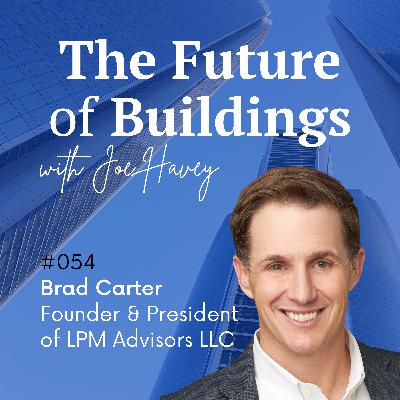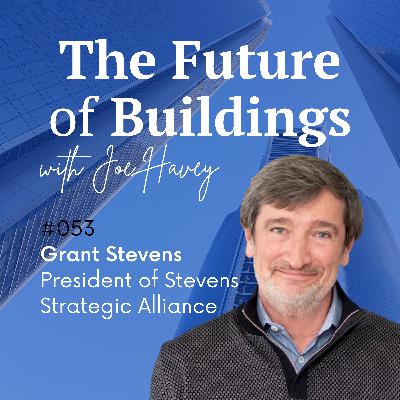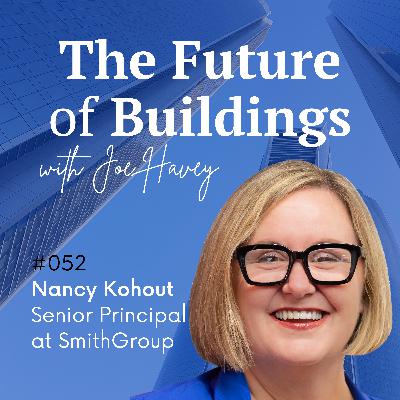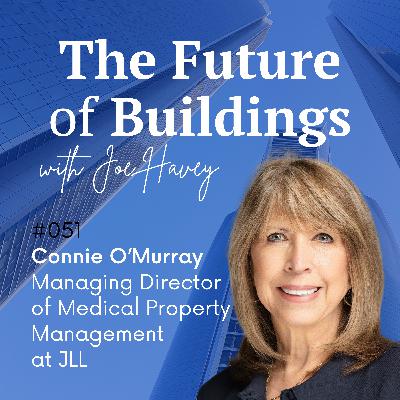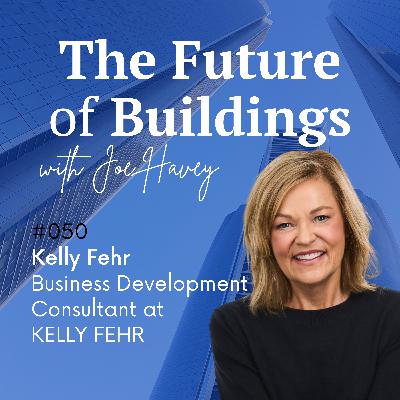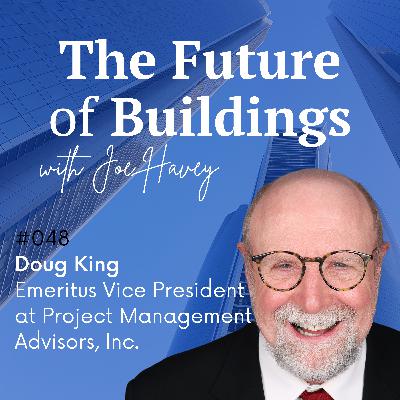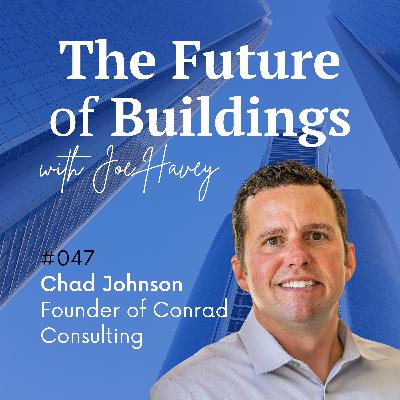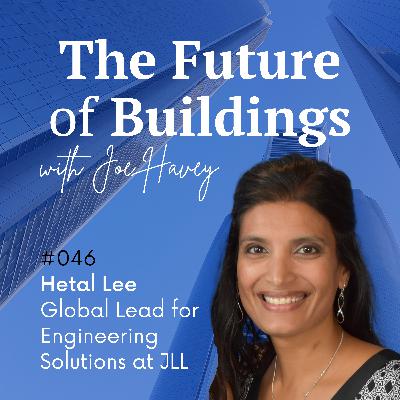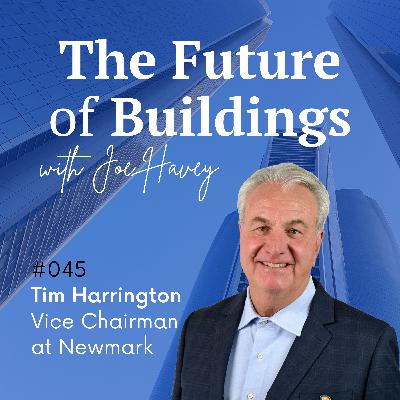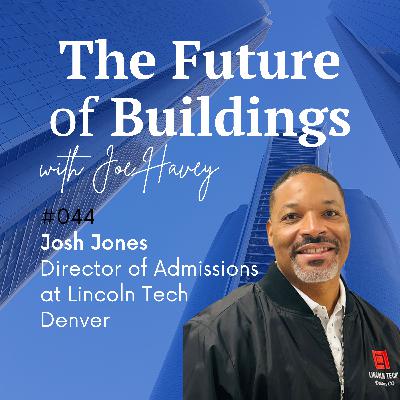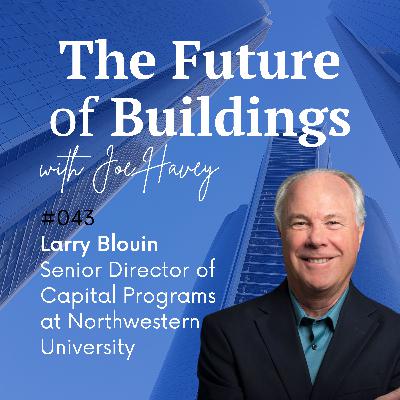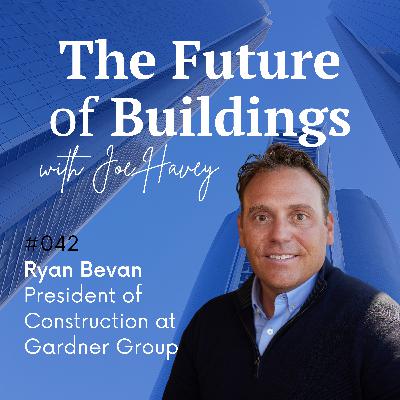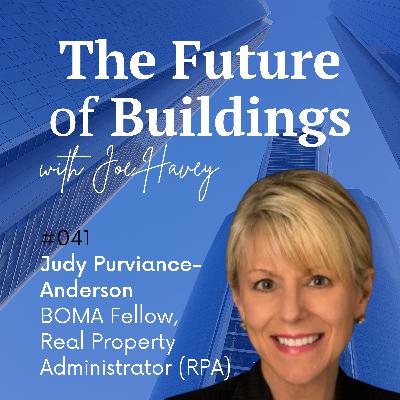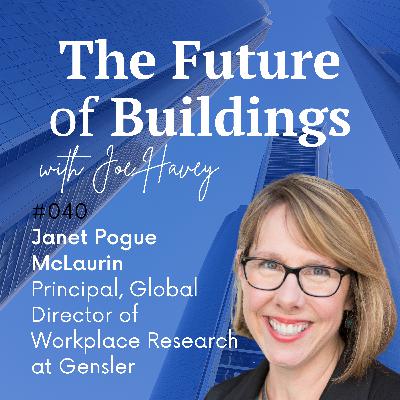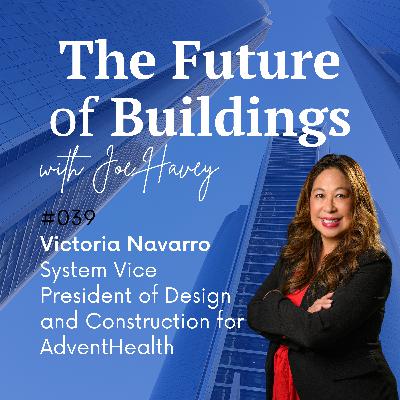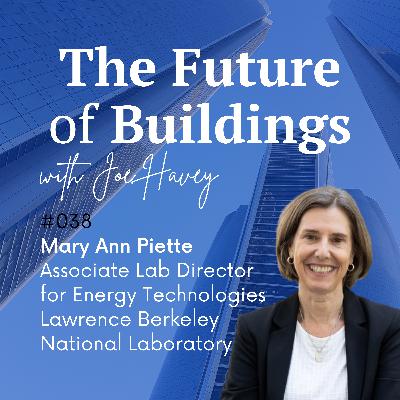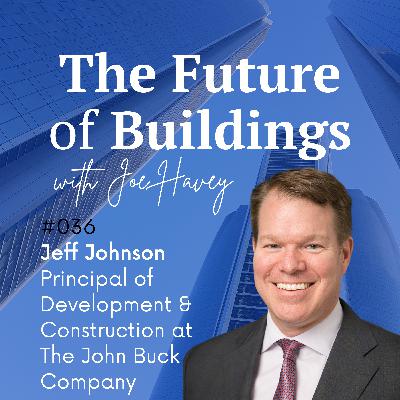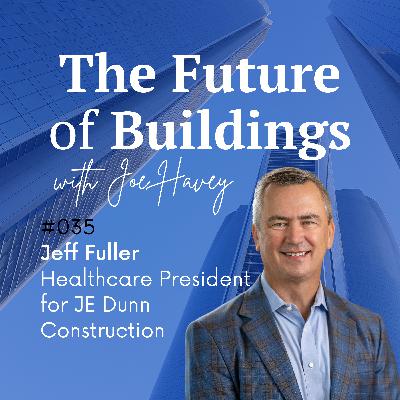Discover The Future of Buildings with Joe Havey
The Future of Buildings with Joe Havey

The Future of Buildings with Joe Havey
Author: Joe Havey
Subscribed: 4Played: 6Subscribe
Share
© 2023 by Joe Havey
Description
“The Future of Buildings with Joe Havey" features groundbreaking conversations on critical issues in building design, construction, property management, or facilities management. These issues address acute shortages of blue-collar labor, stringent energy efficiency regulations, expanding diverse hiring, and more.
54 Episodes
Reverse
What is the most critical element that needs to be in place at the very beginning of a construction project? How can you get ahead of the most overlooked risks during the construction phase? What changes in the construction process will determine the next decade of building innovation? Brad Carter, Founder and President of LPM Advisors LLC, answered these and other key questions on a recent episode of The Future of Buildings with Joe Havey. Brad has over 26 years of leadership experience in the construction industry. He has guided project teams from concept through completion, making him an expert in all aspects of the building construction process. Most recently, he served as Vice President and Operations Manager for Turner Construction in Chicago. In that role, he led more than 200 staff and oversaw $700 million in annual revenue. Throughout his career, Brad has emphasized safety, culture, and continuous improvement. In 2025, he launched LPM Advisors to help owners and stakeholders achieve project success through innovative construction consulting. Listen to Brad’s insights on "The Future of Buildings with Joe Havey" in your favorite podcast app. In this episode: 01:25 Introduction 02:35 Early lessons at Turner Construction 12:25 The beginnings of LPM Advisors 15:45 The critical elements of the construction process 22:57 Getting ahead of the risks 27:15 Future of building innovation 33:35 Final thoughts Connect with Joe: Website: https://www.ecube.com/ LinkedIn: https://www.linkedin.com/in/joe-havey-cem-leed-ap/ Connect with Brad: Website: https://lpmadvisorsllc.com/ LinkedIn: https://www.linkedin.com/in/brad-carter-81360617/ If you enjoyed the podcast, please leave a review of "The Future of Buildings with Joe Havey" on Apple and Spotify!
How do real estate markets in Europe and India differ from the U.S.? Why is the construction industry notoriously resistant to change? What are the biggest impediments to design and construction, and how can we overcome them? Grant Stevens, president of Stevens Strategic Alliance, answered these and other intriguing questions on a recent episode of The Future of Buildings with Joe Havey. Grant brings over 40 years of experience in real estate, having led more than 365 projects across 55 markets and $9.5 billion in development. His work includes expanding Hines into Europe and India, managing iconic projects like the Frank Gehry-designed New World Symphony in Miami, and advising Stanford’s Global Projects Center. Grant’s expertise connects innovation, proptech, and real-world challenges—helping the industry overcome barriers to change. His work has been recognized with awards from MagnateView, the Denver Award Program, Construction Tech Review, CIOReview, and others. Listen to Grant’s insights on The Future of Buildings with Joe Havey in your favorite podcast app. In this episode: 00:00 Introduction 00:44 Meet Grant Stevens 01:56 Challenges and innovations in India 05:50 Real estate landscapes: US, Europe, and India 09:48 One Horizon Center in India 11:29 New World Symphony in Miami 16:45 Shaping innovation with Stanford's Global Project Center 21:41 Real estate's resistance to change 27:18 Future of building spaces: user expectations Connect with Joe: Website: https://www.ecube.com/LinkedIn: https://www.linkedin.com/in/joe-havey-cem-leed-ap/ Connect with Grant: Website: https://stevenssa.com/LinkedIn: https://www.linkedin.com/in/grantraymondstevens If you enjoyed the podcast, please leave a review of The Future of Buildings with Joe Havey on Apple and Spotify!
What is data center heat recovery and why does it matter for decarbonization? How do penalties and fines (from inefficient energy management) reshape building design and operation? Why is storytelling a crucial skill for engineers? Nancy Kohout – senior principal and mechanical discipline leader at SmithGroup – answered these questions on a recent episode of The Future of Buildings with Joe Havey. Nancy is a licensed mechanical engineer based in Chicago, with 30 years of experience in decarbonization strategy, mechanical design, and team leadership. She is also a technical account manager for the U.S. Department of Energy’s Better Climate Challenge. Her passions lie in driving progress on electrification and heat recovery, and in creating clear pathways to leadership for women in engineering. Nancy currently serves as president of the Illinois chapter of ASHRAE and co-chairs the upcoming 2026 Women in ASHRAE Leadership Symposium. Outside of work, she enjoys road-tripping to national parks in her camper van, exploring new cultures through travel, and spending time with her family. Listen to Nancy’s insights on The Future of Buildings with Joe Havey in your favorite podcast app. In this episode: 00:00 Introduction 02:07 Nancy's journey into engineering 06:07 The importance of storytelling in engineering 08:14 Working with the U.S. Department of Energy's Better Climate Challenge 13:44 Strategic decarbonization in engineering projects 19:22 The inevitable rise of energy inefficiency penalties and fines 20:11 Challenges and opportunities in electrification of heating systems 22:53 Peak shaving and grid-interactive design 24:46 Data center heat recovery and decarbonization 26:29 The role of policy in waste heat reuse 31:46 Women in ASHRAE Leadership Symposium 35:55 Final thoughts Connect with Joe: LinkedIn: https://www.linkedin.com/in/joe-havey-cem-leed-ap/ Connect with Nancy Kohout: LinkedIn: https://www.linkedin.com/in/nancy-kohout-p-e-leed-ap-151b9822/ If you enjoyed the podcast, please leave a review of The Future of Buildings with Joe Havey on Apple or Spotify.
What sets medical real estate apart from other asset types? What are the biggest challenges and opportunities in managing these properties today? Which emerging trends are shaping the future of medical buildings? Connie O’Murray addresses these and other key issues in medical real estate. Connie is the Managing Director of Medical Property Management at JLL, where she leads the national strategy for healthcare real estate. She has over 35 years of experience in commercial real estate, including 14 years focused on medical properties. Connie is an expert in medical property management, with a deep understanding of the challenges, opportunities, and emerging trends in medical buildings. She created JLL’s national platform and certification program for managing medical buildings, designed to meet the unique needs of healthcare clients. She also plays an active role in the industry and currently serves as Co-Chair of the BOMA International Medical Office Conference (2024–2025), with past and current leadership roles in BOMA chapters in Houston, Denver, and Southern Colorado. Listen to Connie O’Murray’s insights on The Future of Buildings with Joe Havey in your favorite podcast app. In this episode: 01:26 Introduction 02:42 How BOMA shaped Connie’s career 08:15 What makes medical real estate unique 14:50 Leadership lessons from Connie's experience 18:45 Challenges and opportunities in medical real estate 22:20 Trends shaping medical buildings' future 28:58 Why specialization matters in healthcare real estate Connect with Joe: LinkedIn: https://www.linkedin.com/in/joe-havey-cem-leed-ap/ Connect with Connie O’Murray: LinkedIn:https://www.linkedin.com/in/connie-o-murray-0a42a29/ If you enjoyed the podcast, please leave a review of The Future of Buildings with Joe Havey on Apple and Spotify!
What are the biggest business development mistakes design professionals make? What are the do’s and don’ts for firms looking to expand into new markets? How do you ensure ongoing client satisfaction and engagement after a project is underway? Kelly Fehr—a business development consultant for the design and construction industry—answered these and many other key questions to help futureproof your business. Kelly Fehr is a business development consultant specializing in helping architectural and engineering design firms worldwide. With a background in behavioral science from UC Davis, she took an unconventional path into the design and construction industry. She built her expertise from the ground up, learning how to connect design professionals and contractors with the right opportunities. She has helped design firms land multi-million-dollar projects, including work at Denver International Airport. Her approach combines deep market research with strong relationship-building—what she calls “discovery-driven client development.” Kelly has spoken at national and local American Institute of Architects (AIA) conferences. She leads workshops on how to talk to clients about climate change and the built environment. For Kelly, innovation happens when owners and design professionals truly connect, and she believes business development (essentially business relationships) should be both productive and fun. Listen to Kelly’s insights on The Future of Buildings with Joe Havey in your favorite podcast app. In this episode: 01:30 Meet Kelly Fehr 02:45 Kelly's unconventional career path 03:27 Behavioral science and business development 05:30 Denver International Airport opportunity 07:45 Discovery-driven client development 15:10 Expanding into new markets 18:35 Ensuring ongoing client satisfaction 23:00 Making business development fun 25:50 Futureproofing your business 26:50 Final thoughts Connect with Joe: LinkedIn: https://www.linkedin.com/in/joe-havey-cem-leed-ap/ Connect with Kelly: LinkedIn: https://www.linkedin.com/in/kellyfehr/ If you enjoyed the podcast, please leave a review of "The Future of Buildings with Joe Havey" on Apple and Spotify!
How do cultural influences shape modern architecture? What strategies help architects create more inclusive spaces? How can collaboration improve the design process for complex projects? Mani Farhadi answers these and other key questions on the latest episode of The Future of Buildings. Mani Farhadi is a prominent thought leader and Senior Facilities Planner at Stanford University’s School of Medicine. She has over 30 years of experience in design and planning, specializing in educational environments. Mani’s Iranian roots and American upbringing have shaped her unique approach and viewpoint to life in general, as well as architecture and leadership. She had her rights trampled in Iran decades ago, and carries that experience with her to this day. She is sensitive to how we treat each other as people in the workplace, and making the world a better place. She focuses on human-centered design, emphasizing empathy, collaboration, and making sure all voices are heard in the planning process. As a passionate mentor and guide, Mani has facilitated workshops, Town Halls, and presented at major conferences such as the American Institute of Architects (AIA), Society for College and University Planning (SCUP), and San Francisco Design Week. She serves on several nonprofit boards, including the Institute for Traditional Psychoethics and Guidance, Wellesley College Alumnae, and the Niosha International Conservatory of Arts. She’s also authored several publications, including blogs on topics like “Design Your Life” and “An Education to Remember” published by Perkins + Will in their annual publication “Current.” Listen to Mani Farhadi's insights on "The Future of Buildings with Joe Havey" in your favorite podcast app. In this episode: 02:30 Mani Farhadi's early inspirations 06:02 Educational journey and early career 08:31 Cultural influences on architecture 14:11 Mentorship and advocacy 19:19 Human-centered design principles 22:29 Navigating complex projects at Stanford 31:41 Global trends in architecture 36:36 Final thoughts Connect with Joe: LinkedIn: https://www.linkedin.com/in/joe-havey-cem-leed-ap/ Connect with Mani Farhadi: Linktr.ee: https://linktr.ee/manifarhadi LinkedIn: https://www.linkedin.com/in/mani-ardalan-farhadi-6294183/ Instagram: https://www.instagram.com/mani2farhadi/ Facebook: https://www.facebook.com/mani.a.farhadi/ If you enjoyed the podcast, please leave a review of "The Future of Buildings with Joe Havey" on Apple and Spotify!
What are the latest innovations in urban healthcare design? How can intelligent building design improve sustainability? How did mobile architecture and emergency response planning evolve since 2020? Doug King gives his insights to these and other important topics related to architecture, thought leadership and sustainability. Doug King is Emeritus VP with Project Management Advisors. Doug has served as a healthcare industry consultant, architect, researcher, and academic over the last 45 years. His expertise encompasses high-rise and urban healthcare facilities, community planning, emergency response planning and mobile architecture. He was recognized as the top Healthcare Architect in the U.S. for 2020-21 by Healthcare Design Magazine and has been featured in prominent outlets including The New York Times, Healthcare Design Magazine, and Bisnow. Doug has significantly influenced the healthcare industry on both national and international levels. This includes serving as an appointed member of the Urban Land Institute’s Health Leaders Network. As an educator, he has mentored future architects at institutions including the University of Illinois, Northwestern University and the University of Pennsylvania. Today, as the founder of Douglas King LLC, he advises the healthcare industry, applying his expertise to shape intelligent and sustainable buildings. Listen to Doug King’s insights on The Future of Buildings with Joe Havey in your favorite podcast app. In this episode: 00:00 Introduction 03:17 Doug's early inspirations and education 05:45 Journey into healthcare design 12:00 Mobile architecture and emergency response 13:14 COVID-19 response and emergency planning 18:04 Northwestern Memorial Hospital Feinberg and Galter Pavilions: a career-defining project 24:30 Intelligent building design and sustainability 27:20 Advice for aspiring thought leaders 30:48 Key qualities for professional success 35:07 Final thoughts Connect with Joe: LinkedIn: https://www.linkedin.com/in/joe-havey-cem-leed-ap/ Connect with Doug: LinkedIn: https://www.linkedin.com/in/dougkingpmainc/ If you enjoyed the podcast, please leave a review of "The Future of Buildings with Joe Havey" on Apple and Spotify!
What’s the difference between design-bid-build, design-build and design-assist construction methods, and how do you choose the best approach? How are technologies like AI and 6D modeling shaping the future of construction? What does “best value” really mean in managing contractors and design professionals? Chad Johnson, founder of Conrad Consulting, answers these and more on the latest episode of The Future of Buildings with Joe Havey. Chad’s real estate career spans industries from biotech labs and R&D facilities, to iconic sports stadiums. Chad graduated from the United States Merchant Marine Academy and then went to work for Duke Engineering & Services. He gained hands-on experience in feasibility studies, engineering packages, and procurement for central energy facilities. He launched his own firm in 2003, specializing in planning, construction management, and commissioning services. His impressive portfolio includes managing Levi’s Stadium—the first LEED Gold NFL stadium—and leading engineering and commissioning for Allegiant Stadium, home of the Las Vegas Raiders. Listen to Chad’s unique insights into project delivery methods, emerging technologies, and project management strategies in your favorite podcast app! In this episode: 00:00 Introduction 02:48 Early life and career beginnings 06:00 Lessons from projects at Duke Engineering 11:00 Best value in project management 15:55 Design build vs. design assist 23:40 Commissioning: initial vs. retro 28:48 Challenges in managing complex projects 32:15 Future trends in construction technology 35:39 Final thoughts Connect with Joe: LinkedIn: https://www.linkedin.com/in/joe-havey-cem-leed-ap/ Connect with Chad: LinkedIn: https://www.linkedin.com/in/conradconsulting/
What are the biggest challenges in asset management for engineering? How do you grow and manage a global, diverse team? What is reliability-centered maintenance, and how does it improve operational efficiency? Hetal Lee, the Global Lead for Engineering Solutions at JLL, answers these questions and more in this insightful episode about engineering solutions in buildings. Hetal holds a bachelor’s degree from the Milwaukee School of Engineering and an MBA from DePaul University. Before joining JLL, she honed her expertise in engineering sales and specialty product development, bridging the gap between sales and operations. At JLL, Hetal leads a team that develops client-focused engineering strategies by integrating IoT, data, and reliability-centered maintenance to enhance asset management value and efficiency. Her experience includes RFP management, pitch evaluation, and AI applications in asset onboarding. She combines technical proficiency with a holistic approach to team building and fostering diversity. With a career spanning 22 years, Hetal has earned numerous accolades. She is a Certified Reliability Leader, a Board Member of SHE Builds, an active member and mentor in ASHRAE and Women in ASHRAE, IFMA FMP Certified, and a published author of the Price Industries Engineer’s Handbook. Listen to Hetal’s invaluable insights in your favorite podcast app. In this episode: 00:00 Introduction 03:00 Career journey and key milestones 05:00 Engineering approach: beyond traditional sales 06:30 Creating a global engineering strategy 09:40 Managing a global and diverse team 12:30 Enhancing onboarding, training, and collaboration 15:45 Reliability-centered maintenance: improving operational efficiency 19:00 Predictive maintenance with IoT and data analytics 23:00 Challenges in asset management and engineering 28:00 Personal insights and career advice 30:23 Conclusion and final thoughts Connect with Joe: LinkedIn: https://www.linkedin.com/in/joe-havey-cem-leed-ap/ Connect with Hetal: LinkedIn: https://www.linkedin.com/in/hetal-lee
What strategies help real estate professionals thrive through market shifts? How can functionally obsolete buildings be reimagined for today’s needs? What is the new industry standard for attracting tenants back to buildings? Tim Harrington, Vice Chairman at Newmark in Denver, discussed these and other intriguing questions on the recent episode of The Future of Buildings with Joe Havey. Tim represents major national clients, providing them with comprehensive market insights, financial utilization, and sustainability strategies. Tim has negotiated leases and sales for over 150 million square feet of office, retail, and industrial space, totaling more than $5 billion in value. He has been consistently recognized for his exceptional performance. This includes National Rookie of the Year in 1987 and the top broker nationwide for Grubb & Ellis in 2001. Tim was selected from thousands of brokers nationwide to receive the Hal Ellis Award in recognition of his professional excellence, leadership, and high ethical standards. In this episode: 00:00 Introduction 02:44 Tim Harrington's career beginnings 04:00 Overcoming early career challenges 05:53 Achieving national recognition 07:57 Keys to consistent success 13:15 Impact of COVID-19 on commercial real estate 17:20 Innovative approaches to obsolete buildings 20:33 Creating people-centric workplaces 28:03 Simple advice that can help change the world Connect with Joe: LinkedIn: https://www.linkedin.com/in/joe-havey-cem-leed-ap/ Connect with Tim: LinkedIn: https://www.linkedin.com/in/tim-harrington-24555740/ Listen to Tim’s forward-thinking strategies on your favorite podcast app.
Why do Tesla and Johnson Controls recruit and hire Lincoln Tech graduates? What’s the best way to increase inclusion in the industry from the ground-up? How is Lincoln Tech working to address the labor shortage of HVAC technicians? Josh Jones, the Director of Admissions at Lincoln Tech - Denver, answered these and other interesting questions on the recent podcast episode of “The Future of Buildings with Joe Havey.” As a Lincoln Tech graduate myself, I wanted to speak with Josh about how Lincoln Tech is tackling the labor shortage and other challenges our industry faces today. With a focus on diversity, sustainability, and hands-on training, Josh revealed how Lincoln Tech prepares students for dynamic careers, including post-graduate opportunities with leaders like Tesla and Johnson Controls. Listen to Josh's insights on "The Future of Buildings with Joe Havey" in your favorite podcast app. In this episode: 00:00 Introduction 01:35 Josh Jones' background and journey 04:32 Addressing the HVAC industry labor shortage 07:21 Lincoln Tech's initiatives and partnerships 10:17 Emerging trends in HVAC education 14:00 Bridging the skills gap 18:42 Creating opportunities for graduates 24:30 Diversity and inclusion at Lincoln Tech 28:55 Final thoughts Connect with Joe: LinkedIn: https://www.linkedin.com/in/joe-havey-cem-leed-ap/ Connect with Josh: Email: jjones@lincolntech.edu Instagram: @lincolntechdenver Website: Lincolntech.edu If you enjoyed the podcast, please leave a review of "The Future of Buildings with Joe Havey" on Apple and Spotify!
How can we balance the cost of new technology with ambitious sustainability goals? Can technology bridge critical gaps, including the operations and construction labor shortage? Why is collaboration more essential than ever for the future of construction? These are just some of the thought-provoking questions Larry Blouin addresses in the latest episode of “The Future of Buildings with Joe Havey.” Larry Blouin, Senior Director of Capital Programs at Northwestern University in the Chicago area, brings over 40 years of experience in construction and facilities management. Known for his strategic planning and project leadership, Larry currently leads a team overseeing $1.5 billion in projects across Northwestern’s campuses. Previously, he directed $1 billion in construction initiatives at the University of Chicago and held senior roles at top national construction firms. Larry’s expertise spans a variety of project delivery methods, including design-build and construction management at risk (CMAR), consistently prioritizing collaboration, innovation, and efficiency in every project. Listen to Larry Blouin's insights on "The Future of Buildings with Joe Havey" in your favorite podcast app. In this episode: 00:00 Preview 02:14 Introduction 03:11 Larry Blouin's Early Inspirations 07:40 Addressing Labor Shortages in the Industry 09:05 Technological Advancements in Construction 11:50 Encouraging Career Day Participation 15:00 Affordability of New Technologies 16:25 Future of Project Delivery 18:05 Importance of Collaboration 20:00 Embracing Technology and Relationships 23:35 Final Thoughts Connect with Joe Havey: LinkedIn: https://www.linkedin.com/in/joe-havey-cem-leed-ap/ Connect with Larry Blouin: LinkedIn: https://www.linkedin.com/in/larry-blouin-12701510/ If you enjoyed the podcast, please leave a review of "The Future of Buildings with Joe Havey" on Apple and Spotify!
What are the unique challenges in multi-family residential developments? How are recent trends in construction financing shaping the industry? What obstacles remain in overcoming the construction industry labor shortage? Ryan Bevan, President of Construction at Gardner Group and a former Adjunct Professor at Brigham Young University, answered these and other fascinating questions on my podcast. Ryan has two decades of experience managing construction projects, including commercial spaces, site development, retail, and multi-family residential developments. Over the past 11 years at Gardner Group, Ryan has overseen the development and management of over $1.5 billion in commercial projects. His work has earned multiple design awards and has been featured in prestigious publications including Utah Contractors Magazine and Architectural Review. Beyond his professional achievements, Ryan is also an adjunct professor in the Construction Management Master's Program at Brigham Young University and has served as Chair of BYU’s Industry Advisory Committee for 10 years. In this episode: 00:00 Introduction 02:50 From Dentistry to Construction 05:43 The Evolution of Construction Technology 10:10 Pivotal Projects 12:42 Future Trends in Construction 16:00 Challenges in Multifamily Housing 19:40 Financing and Private Equity in Construction 22:00 Addressing Labor Shortages in Construction 26:00 The Importance of Relationships in Construction Connect with Joe: LinkedIn: https://www.linkedin.com/in/joe-havey-cem-leed-ap/ Connect with Ryan: LinkedIn: https://www.linkedin.com/in/ryan-bevan-30468a8/ If you enjoyed the podcast, please leave a review of "The Future of Buildings with Joe Havey" on Apple and Spotify!
How has COVID-19 affected property management and asset value? How to navigate the challenges of stringent government regulations in building management? Why are operational analysis and tech integration essential for sustainability in buildings? Judy Perviance Anderson – RPA, BOMA Fellow, answered these and other burning questions on a new episode of my podcast. Judy is a seasoned professional with over three decades of commercial real estate management experience. She holds a bachelor's degree in Business Management at the University of Phoenix, and completed the Emerging Leaders in Real Estate Program at Harvard University Graduate School of Design. She has managed 1670 Broadway for many years, a prominent high-rise office tower in Denver's Central Business District. Judy is actively engaged with BOMA (Building Owners and Managers Association) both locally and internationally. She served as President of Denver Metro BOMA and as a Denver BOMA Director. She has been instrumental in monitoring and shaping government policies and initiatives that promote the real estate industry. Listen to Judy’s insights in your favorite podcast app. In this episode: 00:00 Introduction 00:57 Managing an iconic downtown high-rise office tower 03:20 Navigating post-COVID financial turmoil 05:32 Stringent regulations and cash flow challenges 18:22 Importance of operational analysis 32:16 The necessity of ongoing training 33:12 Final thoughts Connect with Joe: LinkedIn: https://www.linkedin.com/in/joe-havey-cem-leed-ap/ Connect with Judy: LinkedIn: https://www.linkedin.com/in/judy-purviance-anderson-6038aa20/ If you enjoyed the podcast, please leave a review of "The Future of Buildings with Joe Havey" on Apple and Spotify!
What does designing for families and distributed teams look like? How did COVID-19 pandemic influence work habits, and how can building owners adapt to this shift? What can companies do to ensure that their physical spaces accommodate the diverse needs of their workforce? Janet Pogue – Principal and Global Director of Workplace Research at Gensler – answered these and many other important questions on my podcast. Janet has been instrumental in leading global Workplace Surveys and the Workplace Performance Index® (WPI), measuring how people work, space effectiveness and workplace experience. Janet has developed workplace strategies for clients such as Vanguard, Capital One, Gallup, General Motors McDonald's, The Coca-Cola Company, and more. She is a sought-after spokesperson at industry events, including The Wall Street Journal Future of Everything Festival, CoreNet Global, and IFMA World Workplace. Recently elevated to Fellow in the American Institute of Architects, Janet successfully balances her professional achievements with her role as a proud mother and grandmother. Listen to Janet’s insights on "The Future of Buildings with Joe Havey" in your favorite podcast app. In this episode: 00:00 Introduction 01:36 Reflecting on the 40-year long professional journey 03:16 Public speaking beginnings 05:26 Transformation of workplace design over decades 06:32 Navigating the new normal: workplace design post-COVID-19 18:57 Embracing diversity, equity, and inclusion in workplace design 24:32 The future of work: designing for families and distributed teams 28:09 Exploring generative design and its impact 30:29 Final thoughts Connect with Joe: LinkedIn: https://www.linkedin.com/in/joe-havey-cem-leed-ap/ Connect with Janet: LinkedIn: https://www.linkedin.com/in/janet-pogue-mclaurin-faia-fiida-604b913/ If you enjoyed the podcast, please leave a review of "The Future of Buildings with Joe Havey" on Apple and Spotify!
What are the challenges of implementing integrated project delivery in healthcare design and construction? How can we promote diversity within the real estate and construction industry? Victoria Navarro shared her experience, on my Podcast, working with renowned architects like Alfred Caldwell and Bertrand Goldberg in Chicago. She also shares her journey as a first-generation Filipino American and a highly influential woman in the industry. Victoria is a healthcare design and construction executive with 25 years of leadership experience. She holds a Bachelor of Architecture from the Illinois Institute of Technology and an MBA in Healthcare Management from Loyola University of Chicago. Victoria is currently serving as the System Vice President of the Design & Construction Center of Excellence at AdventHealth. She oversees the planning, aligning, and monitoring of the design and construction functions of the company. Victoria's extensive career includes strategic oversight of healthcare capital projects, totaling over $3 billion in value. She spearheaded the first LEED Healthcare Gold Certified hospital project in the Midwest. Beyond her professional achievements, Victoria is a dedicated advocate, contributing to various boards. She is a recipient of the Lean Construction Institute Chicago Community of Practice’s 3rd Annual Bob Krier Award, and the 2020 Milwaukee Business Journal Women of Influence Award, among others. Listen to Victoria's insights on "The Future of Buildings with Joe Havey" in your favorite podcast app. In this episode: Introduction (1:40) Transition from civil engineering to architecture (4:40) Experience working for renowned architects in Chicago (7:00) Impact of motherhood on career trajectory (9:30) Pursuing an MBA while working full-time (17:00) Implementing integrated project delivery in healthcare (21:00) Mentoring and promoting diversity in the industry (30:00) Owning one's purpose (32:00) Final thoughts (35:30) Connect with Joe: LinkedIn: https://www.linkedin.com/in/joe-havey-cem-leed-ap/ Connect with Victoria: LinkedIn: https://www.linkedin.com/in/victoria-navarro-mba-hcm-1461a795/ If you enjoyed the podcast, please leave a review of "The Future of Buildings with Joe Havey" on Apple and Spotify!
What are the key strategies for reducing energy usage and decarbonizing buildings? What role do grid-interactive buildings play in the broader energy landscape? How can we use emerging technologies and methodologies, such as digital twins and artificial intelligence, to improve building operations and energy management? Mary Ann Piette, Associate Lab Director for Energy Technologies at Lawrence Berkeley National Laboratory (LBNL), answered these and many other interesting questions on my podcast. Mary Ann holds a Master’s Degree in Mechanical Engineering from UC Berkeley and a Licentiate in Building Services Engineering from Chalmers University of Technology in Sweden. Mary Ann oversees research at LBNL focused on decarbonization. She manages 700 staff and affiliates, including 120 principal investigators, working on diverse technology R&D programs spanning energy efficiency, grid integration, hydrogen, storage, and renewables. Mary Ann recently received a Lifetime Achievement Award for energy-efficient and grid-interactive buildings research. She has written over 100 peer-reviewed publications She’s a recipient of two R&D 100 awards for tools evaluating energy efficiency strategies. Mary Ann's global research experience includes work in Australia and Sweden, and she is a founding Board member of the OpenADR Alliance. Listen to Mary Ann’s insights in your favorite podcast app. In this episode: Introduction (01:24) Inspiration behind pursuing mechanical engineering (2:47) Learning and working in Sweden (4:00) Energy information systems & commissioning (5:45) Automating demand response (7:52) Role of facility managers in energy efficiency (10:00) Launch of the Grid-Interactive Efficient Buildings Roadmap (12:38) Collaborative effort in buildings (19:30) Fines and penalties (21:30) Materials to learn about reducing carbon footprint (23:23) Best ways to decarbonize buildings (24:10) Advice for aspiring researchers in energy and sustainability (32:35) Connect with Joe: LinkedIn: https://www.linkedin.com/in/joe-havey-cem-leed-ap/ Connect with Mary Ann Piette: LinkedIn: https://www.linkedin.com/in/mary-ann-piette-8507696/ If you enjoyed the podcast, please leave a review on Apple and Spotify!
What are the biggest challenges of building automation technologies? How do efficient building operations affect customer experience? What does the future hold for Computerized Maintenance Management Systems (CMMS) and building automation systems? Scott Durkin, Senior Director of Engineering in the U.S. for CBRE, answered these and many other questions on my podcast. Scott graduated with a Bachelor’s and Master's degree in Facilities Management from the Massachusetts Maritime Academy. His extensive career includes roles as an Operations Manager, specializing in capital projects, facility maintenance, and building commissioning. Scott brings a wealth of knowledge in cutting-edge building management technologies. Listen to Scott’s insights on your favorite podcast app. In this episode: Introduction (01:22) Scott's journey into facilities management (02:13) Significance of positive customer experiences (05:15) Functionalities within a CMMS for efficient operations (08:11) Proper set-up of CMMS (11:11) Challenges and benefits of new building automation (14:32) Future of CMMS and building automation (18:28) Scott's advice for those entering the industry (22:50) Connect with Joe: LinkedIn: https://www.linkedin.com/in/joe-havey-cem-leed-ap/ Connect with Scott Durkin: LinkedIn: https://www.linkedin.com/in/scott-durkin/ If you enjoyed the podcast, please leave a review on Apple and Spotify!
Is building technology in Europe more advanced than the US? What is adaptive reuse development, and why is it important? What are the challenges that arise during adaptive reuse projects? Jeff Johnson, Principal of Development & Construction at The John Buck Company, answered these and other key questions on the recent episode of my podcast. Prior to The John Buck Company, Jeff managed a $150 million real estate portfolio for Driehaus Enterprise Management and held pivotal roles at Jones Lang LaSalle, Goettsch Partners, and the Architectural Network. Jeff has worked in real estate development internationally for 7 years. His diverse background includes new business development, entitlement review, project team selection, construction contract assembly, and adaptive reuse development. Listen to Jeff Johnson's insights on "The Future of Buildings with Joe Havey" in your favorite podcast app. In this episode: Introduction (01:30) Unconventional background (02:28) Insights from building across the globe (4:07) Working at the Museum of Science and Industry in Chicago (7:55) Adaptive reuse development (12:47) Facing challenges when reusing office buildings (14:50) The future of adaptive reuse development (28:00) Final thoughts (31:31) Connect with Joe: LinkedIn: https://www.linkedin.com/in/joe-havey-cem-leed-ap/ Connect with Jeff Johnson: LinkedIn: https://www.linkedin.com/in/j-jeffery-johnson-a023896/ If you enjoyed the podcast, please leave a review of "The Future of Buildings with Joe Havey" on Apple and Spotify!
How do we foster a problem-solving culture in healthcare construction? What innovative solutions can be implemented to tackle labor and material shortages? What are the advantages and potential challenges that come with prefabrication? Jeff Fuller, Healthcare President for JE Dunn Construction, answers these and other crucial questions on the recent episode of my podcast. Jeff graduated from Purdue University with a degree in Construction Engineering. He’s had a 30-year career as a healthcare builder serving for-profit and not-for-profit clients across the country. Jeff’s expertise encompasses a wide range of projects, including replacement acute care facilities, additions, renovations, ambulatory surgery centers, behavioral health, rehabilitation hospitals, and outpatient facilities. Listen to Jeff’s insights in your favorite podcast app. In this episode: Introduction (00:00) Jeff's early career in pre-construction (02:25) Joining JE Dunn (04:00) The lessons learned from opening a new office across the country (05:30) Briefly leaving the company (08:27) Fostering a culture of open communication and problem-solving (11:00) Addressing the skilled labor shortage and material shortages in construction (15:51) The advantages and potential challenges of prefabrication in the construction industry (21:09) Final thoughts (26:20) Connect with Joe: LinkedIn: https://www.linkedin.com/in/joe-havey-cem-leed-ap/ Connect with Jeff Fuller: LinkedIn: https://www.linkedin.com/in/jeff-fuller-006b018/ If you enjoyed the podcast, please leave a review of "The Future of Buildings with Joe Havey" on Apple and Spotify!


